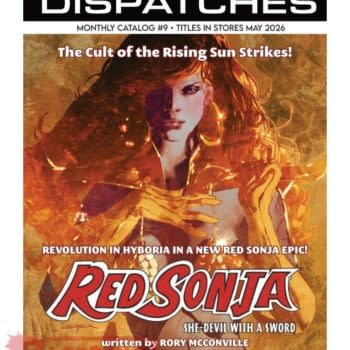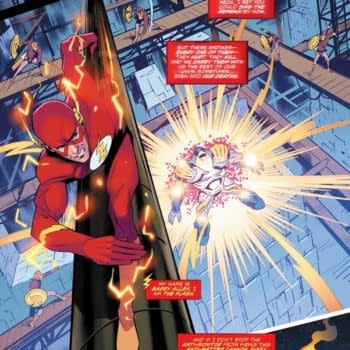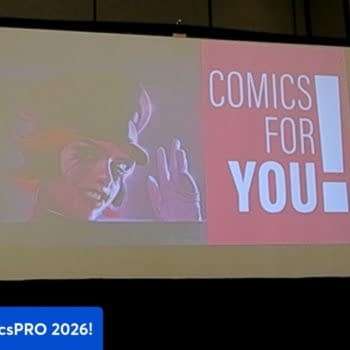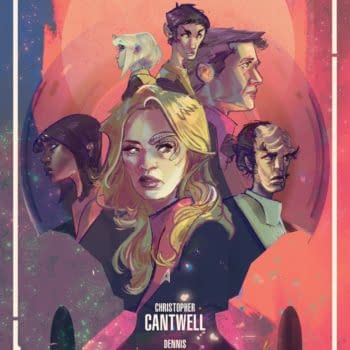Posted in: Comics, Recent Updates | Tagged: Alec Siegel, C.O.W.L., Comics, entertainment, image comics, image expo, kyle higgins, Rod Reis
Looking Under the C.O.W.L. with Kyle Higgins at Image Expo
By Kevin Schmidt
Generally, we think of superheroes as working in small teams, but writers Kyle Higgins and Alec Siegel with artist Rod Reis are looking to change that with their new Image book C.O.W.L. which promises to explore the complexities of a superhero labor union.
Kevin Schmidt: Why did you choose Image for your foray into creator-owned work?
Kyle Higgins: The simple truth is that I love the books Image is putting out. So, when I started thinking about diving into the creator owned waters, I wanted to do it at a company I was inspired by where I felt that I'd be able to do my best work. There are so many books that Image is doing that I read and go, "Holy shit, I don't know how you do that!" So I'm upping my game, that's the goal. I don't want to put out an Image book that is not at the level that my favorite books are at. The other part of it, too, is that Image has the best deal in town, you know? It's a company where you control everything. That puts a lot of things on your shoulders as a creator and a lot of different pressures than doing a book at a different publisher. It also gives me this sense of ownership and investment that is really cool and something I haven't had up until this point.
KS: A "superhero labor union" is how you described C.O.W.L. What are the origins of that pitch? Does it have its roots in a previous project?
KH: Basically, I did a film when I was in college called The League that Alec Segal and I co-wrote, and that I directed, and that was about the super-hero labor union in 1960's Chicago. The concept, to me, was something that I wanted to mine going forward, but I wasn't sure how. Alec and I always talked about how in a perfect world how great a comic book of this organization would be. We really only scratched the surface in the short film.
The other thing about it, is that aesthetically it plays into a lot of my favorite things. I'm a huge history guy, I love noir, I love crime fiction, thrillers and sci-fi, so setting it in the sixties and playing with a lot of the political intrigue is something that helped me to get inside the concept and to play it straight. I think if you were to set it in the modern-day it would take on more of a tongue-in-cheek kind of feel. But with the sixties in Chicago with the Teamsters and [Jimmy] Hoffa; that whole world feels like this organization could have very easily slotted in there.
KS: There is this rich history of unionization and labor struggles in Chicago, and I'm assuming that's what this series is going to be playing off of?
KH: That's very much what we're playing off of. In issue #1 right off-the-bat, we're setting up that the organization is in the early stages of re-negotiations with the city of Chicago, but with the last of the great villains having been handled the question becomes whether they have much of a purpose in the city, anymore. There's public opinion, there's what City Hall thinks and there's what members of the organization think. It also raises questions, that I haven't seen explored too often about the industry of superheroes and supervillains. Or even just heroes and villains. There's kind of an economy that exists as a result of these two types of people. Even down to the construction industry that has to rebuild after battles like this. It's not even like toppling a building or Avengers (the movie) level destruction, but just the simple potholes in the road that are created when someone slams into the ground (if it doesn't kill them). So there are a lot of questions about what would happen economically if C.O.W.L. weren't around. Not to mention these hundred people who have had this career of helping people, and if C.O.W.L. goes away what do they do? This is the only job they know how to do and for some of them, it's the only thing they're good at. The questions are not as cut and dried as you might think.
KS: Will the focus be mainly on Chicago or do you hope to have the scope of the book broaden as it progresses?
KH: Initially the focus will very much be on Chicago. I want people to get a full appreciation for how C.O.W.L. operates and the inner workings of it – which is very specific to Chicago – before we broaden the scope and show what the rest of the world is like. There will be some exploration, especially of the past and the formation of C.O.W.L. and how it came to be post-World War II, that is a bit more on the global side of things. But at least for the first arc, it will be very centralized and focused on the city of Chicago.
KS: Do you foresee any possible negative response given that some see labor unions as controversial, right now?
KH: There are definitely questions that we raise in the book that explore that very topic. My feeling is that as creators it's not really up to us to give answers — because the truth of the matter is that I don't have them. But I think asking questions and raising awareness of certain things and the different sides of arguments is never a bad thing. It is a little topical, which I think makes the work a little bit more relatable.
KS: No, that very much doesn't sound like a bad thing. I'm looking forward to the book, personally.
KH: It's been fun, we've been working on it for a long time.
KS: How far do you have it planned out? Do you have an endpoint in mind?
KH: Yes, but that endpoint is so far out there. We have the first year mapped out pretty tightly. The fun thing about a book like this, where you have a big ensemble cast, is that you have so many different avenues to explore and so many different stories to tell. Even having a lot of it figured out and mapped out, I'm excited by the possibility of traveling down different paths as we're writing the book and exploring different things that interest us.
The short answer is that it's going to be going for a while.
KS: Do you happen to have any other creator-owned work in the pipeline?
KH: Actually, yes. I have another book at Image that we didn't announce today, but you should be hearing about in the not too distant future.
Kevin Schmidt is a freelance writer who can be found on Twitter as @moonandserpent or racing a deadline in various San francisco coffee shops.
















